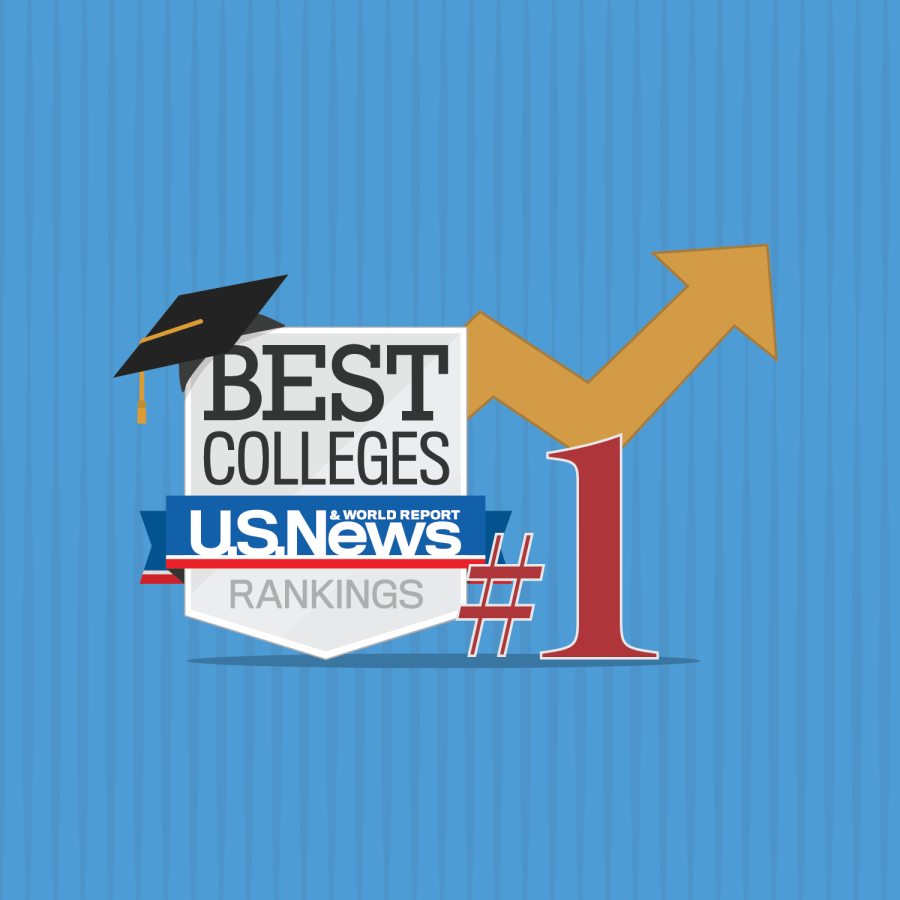Outdated U.S. News & World Report Does Students a Disservice
The U.S. News & World Report college ranking system. You’ve probably heard of it. Your parents and tour guides may have referenced it while you dawdled around different colleges for visits — as long as it was a number worth bragging about.
Since 1983, the U.S. News & World Report has released a ranking of American colleges every year for students, families and college administrations to analyze. This system uses factors like graduation and retention rates, social mobility, graduation rate performance, undergraduate academic reputation, faculty, student test scores, financial aid resources, average alumni giving rate and how much debt graduates have.
The ranking caused more buzz than usual this year when the report dropped Columbia University to spot number 18 from its previous spot at number two. One of Columbia’s own math professors questioned the accuracy of the report based on the date the university submitted its data. This brings up an important point: Colleges submit their own data. This raises questions about the accuracy and helpfulness of the ranking system, two things which I argue are missing from the U.S. News & World Report.
I think a good place to start is the intended audience of the report. Obviously, it is intended for students and their families, but are students really the main audience? Or do their wants and needs get lost in the fray? One reason that I believe the report is no longer helpful is because it has lost sight of its goal to help students. When the rankings come out, all the buzz goes toward which school is at the top of the list. So much attention goes toward the schools at the top of the list, rather than simply celebrating the success of students being accepted into and attending college in general. With student debt higher than ever, inconsistent job prospects within our current economic landscape and the increased cost of living, what college you attend should not matter as much as the fact that you have a degree. By looking at any acceptance into college as a celebration, a ranking list starts to lose its relevance.
In fact, a ranking system alone is not a very helpful way of determining if a college is a good fit. Visiting colleges, attending college promotional events hosted at your high school, speaking to family members and friends about their college experiences and independent research are more personal and tailored approaches. Every student is different and has their own needs, so boiling down all of the colleges in America to a simple numbered list isn’t adequate.
This ranking system only shows that colleges feed into an elitist lens of higher education. By ranking Ivy League schools at the top, the U.S. News & World Report seems to favor elite schools over more accessible and affordable ones. This pushes a message of privilege, where some colleges are more valuable than others because of their prestige and high price tag. That sort of message is no longer relevant in a world where college is a virtual necessity that comes at a steep price. How does this kind of ranking make students at community colleges feel? Some students may see their school’s rankings (or lack of a ranking) and feel bad. This is absolutely the wrong takeaway. Attending college, no matter at what school, and earning a degree is a major life accomplishment.
College is largely about developing a successful professional life. Part of that professional life is having access to a good network of people and attending a college with a positive reputation for your resume. An argument can be made that a ranking list allows students to know exactly which schools will offer them the best network or reputation. In reality, though, this ranking system does not necessarily provide an advantage in the professional world. If anything, the ranking system most directly appeals to parents. Parents may value a ranking system more than students because college used to have a more untouchable place in society. Not everyone can attend college and graduating from college was seen as a jumpstart to a successful career. However, society has changed to a point where college is seen as more of a commonplace, given next step to a good paying job and stable adult life.
The U.S. News & World Report is a relic of a past American society where college rankings reflected the best of the best and provided for healthy competition among the nation’s brightest. The U.S. News & World Report must change to better reflect the needs of students applying to college. This ranking system would do a disservice otherwise.
Sarah Kenny, FCRH ’24, is a political science major from Seattle, W.A.










































































































































































































